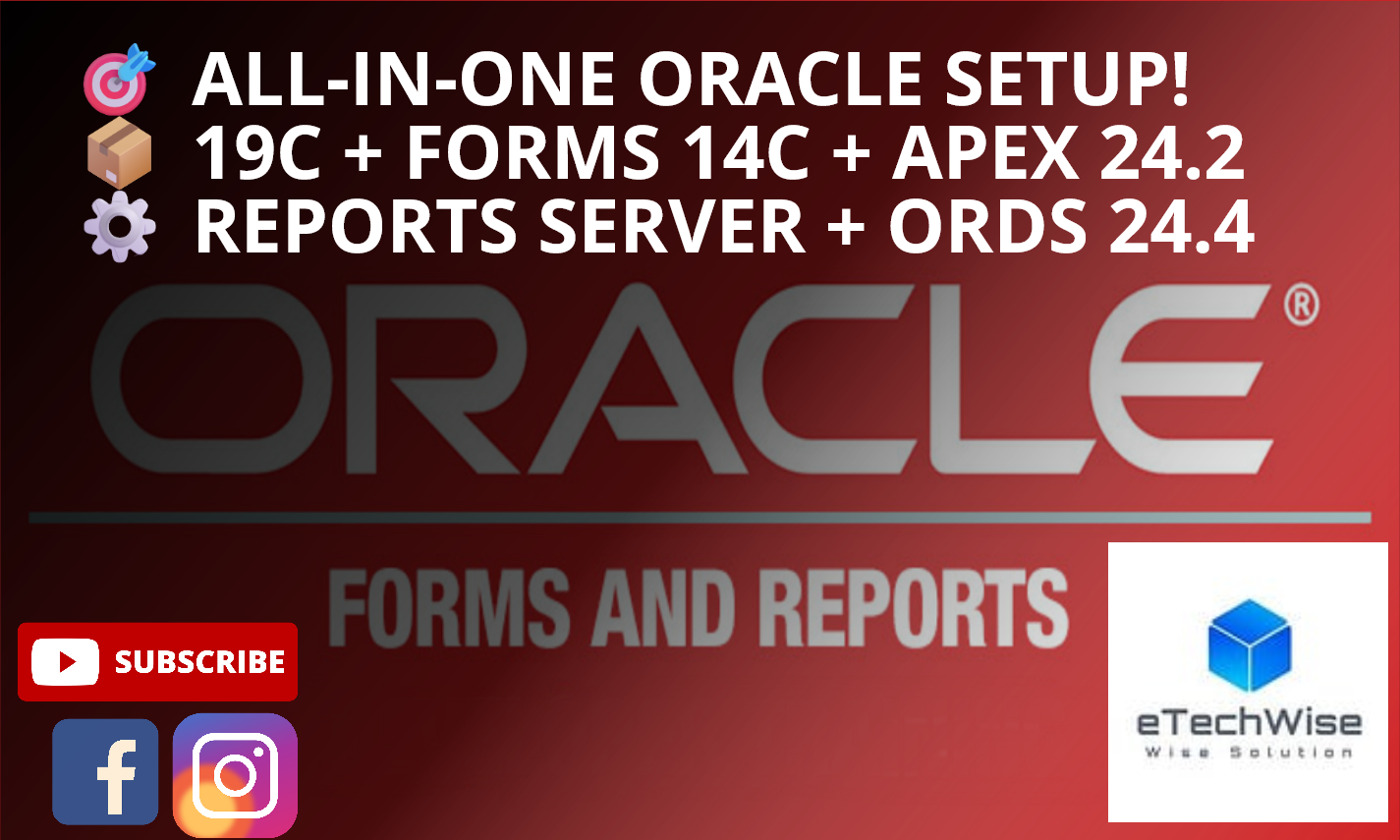✅ Complete Guide: Installing Oracle Database 19c & Oracle Forms/Reports 14c (With Report Server Configuration)
 eTech Wise
eTech WiseTable of contents
- 🚀 Introduction
- 🖥️ Prerequisites
- 1️⃣ Step 1: Install Oracle Database 19c (Non-CDB)
- 2️⃣ Step 2: Install Java JDK (Required for WebLogic & Forms)
- 3️⃣ Step 3: Install Oracle Fusion Middleware Infrastructure 14c
- 4️⃣ Step 4: Install Oracle Forms & Reports 14c
- 5️⃣ Step 5: Repository Creation (RCU)
- 6️⃣ Step 6: Configure WebLogic Domain
- 7️⃣ Step 7: Start the Services
- 8️⃣ Step 8: Configure Reports Server Instance (Essential!)
- 🎯 What’s Next?
- 📧 Contact Information

🚀 Introduction
Oracle Forms and Reports 14c remain the backbone for many enterprise applications even today. Whether you are upgrading your legacy system or building a fresh environment, mastering the setup is crucial.
In this step-by-step guide, you will learn:
✔️ How to install Oracle Database 19c (Non-CDB)
✔️ How to install Oracle Forms and Reports 14c Developer and Runtime
✔️ How to configure Oracle Reports Server 14c
➡️ No browser-based deployment yet—this focuses on core installation and configuration.
🖥️ Prerequisites
Before diving in, make sure you have:
🔹 Windows 10 (64-bit)
🔹 Administrative access
🔹 Enough disk space (~50 GB recommended)
🔹 A stable internet connection (for downloads)
1️⃣ Step 1: Install Oracle Database 19c (Non-CDB)
✅ Download Oracle Database 19c for Windows 64-bit
Download the appropriate release (19.3 for Non-CDB support).
✅ Installation Process
Extract the ZIP file to your desired folder (e.g.,
D:\Oracle19c)Run
setup.exeas AdministratorChoose "Set up software only" for manual DB creation or select "Create and configure a single instance database"
In this guide, we proceed with the Non-CDB option for better compatibility with Oracle Forms 14c
Follow the installer prompts and configure:
Oracle Base:
D:\OracleOracle Home:
D:\Oracle\19c\db_home
Create your database listener
Complete database creation through DBCA (Database Configuration Assistant)
📝 Tip: Always use Non-CDB mode if you’re planning to use Oracle Forms and Reports without complex container setups.
2️⃣ Step 2: Install Java JDK (Required for WebLogic & Forms)
✅ Download and install Java JDK 21 (LTS)
Get it from Oracle JDK Downloads
Install x64 Windows version
Set environment variables:
JAVA_HOME:C:\Program Files\Java\jdk-21Add
%JAVA_HOME%\binto the Path
🚀 Restart your system to apply environment changes.
3️⃣ Step 3: Install Oracle Fusion Middleware Infrastructure 14c
✅ Download Fusion Middleware 14c
This provides the WebLogic Server and core services for Forms/Reports.
Run the installer using:
java -jar fmw_14.1.1_infrastructure.jar
✅ Follow the prompts and install it to your Oracle Middleware Home
Example:
D:\Oracle\Middleware\Oracle_Home
4️⃣ Step 4: Install Oracle Forms & Reports 14c
✅ Download Oracle Forms & Reports 14c (14.1.2)
Run the installer from CMD as Administrator
Choose the existing
Oracle Middleware Homeused in the previous stepComplete the installation by following the wizard
✅ Install Visual C++ Redistributable (if needed)
Download and install Visual C++ All-In-One package (2015–2022 supported)
This ensures the Forms and Reports components run smoothly.
5️⃣ Step 5: Repository Creation (RCU)
✅ Navigate to:
D:\Oracle\Middleware\Oracle_Home\oracle_common\bin
✅ Run rcu.bat to launch Repository Creation Utility
✅ Create the necessary schemas for:
Metadata Services (MDS)
Reports Services
✅ Connect with SYS user and create repositories in your Oracle 19c Non-CDB database.
6️⃣ Step 6: Configure WebLogic Domain
✅ Go to:
D:\Oracle\Middleware\Oracle_Home\oracle_common\common\bin
✅ Run config.cmd
✅ Follow the domain creation wizard:
Create a new domain (e.g.,
base_domain)Select Forms, Reports, and EM (Enterprise Manager) components
Provide credentials and repository schema info
✅ Domain location:
D:\Oracle\Middleware\Oracle_Home\user_projects\domains\base_domain
7️⃣ Step 7: Start the Services
✅ Use Start Menu shortcuts or manually navigate to:
D:\Oracle\Middleware\Oracle_Home\user_projects\domains\base_domain\bin
✅ Start WebLogic Server and Managed Servers
Commands:
startWebLogic.cmd
startManagedWebLogic.cmd WLS_FORMS
startManagedWebLogic.cmd WLS_REPORTS
📝 Tip: Patience is key! Each service may take time to initialize.
8️⃣ Step 8: Configure Reports Server Instance (Essential!)
✅ Launch WebLogic Scripting Tool (WLST)
D:\Oracle\Middleware\Oracle_Home\oracle_common\common\bin\wlst.cmd
✅ Run the commands to create and register the Reports Server instance:
connect('weblogic', 'password', 't3://localhost:7001')
createReportsServerInstance(instanceName='rep_wls_reports')
✅ Restart the WLS_REPORTS Managed Server after configuration.
🎯 What’s Next?
We’ve now completed: ✅ Oracle 19c Non-CDB Database installation
✅ Oracle Forms & Reports 14c setup
✅ Reports Server 14c basic configuration
In the next articles, we’ll cover:
👉 Resolving common errors during report server configuration (REP-51002, REP-51109, REP-52266)
👉 Deploying Forms via Java Web Start and Browserless Mode (frmsal.jar)
👉 Installing Oracle APEX 24.2 with ORDS 24.4 Standalone
📺 Watch the full video now to see it all in action!
👉 Watch Video (https://www.youtube.com/watch?v=xr_p3bMIRY4&lc=UgzRSzGvd_QSEPxS46J4AaABAg)
📧 Contact Information
💼 If you need any help or consultation for Oracle Forms, Reports, APEX, or Database installations:
📨 Email: etechwise21@gmail.com
📱 WhatsApp: +923327674430
🌐 YouTube Channel: eTechWise
Subscribe to my newsletter
Read articles from eTech Wise directly inside your inbox. Subscribe to the newsletter, and don't miss out.
Written by
